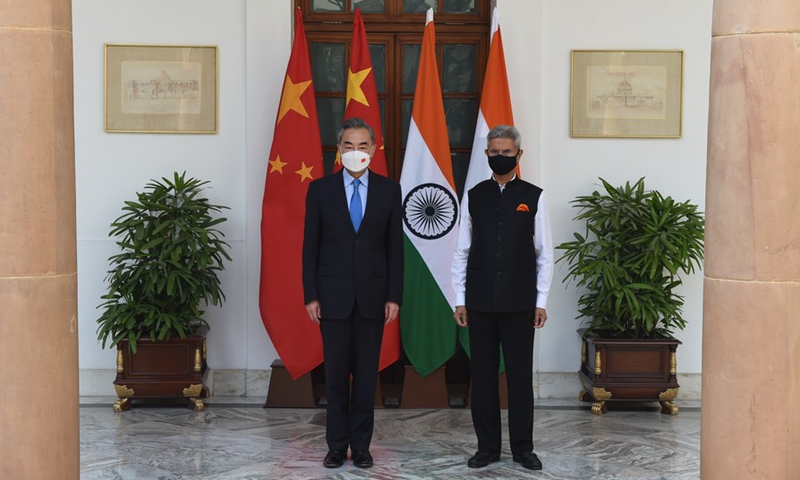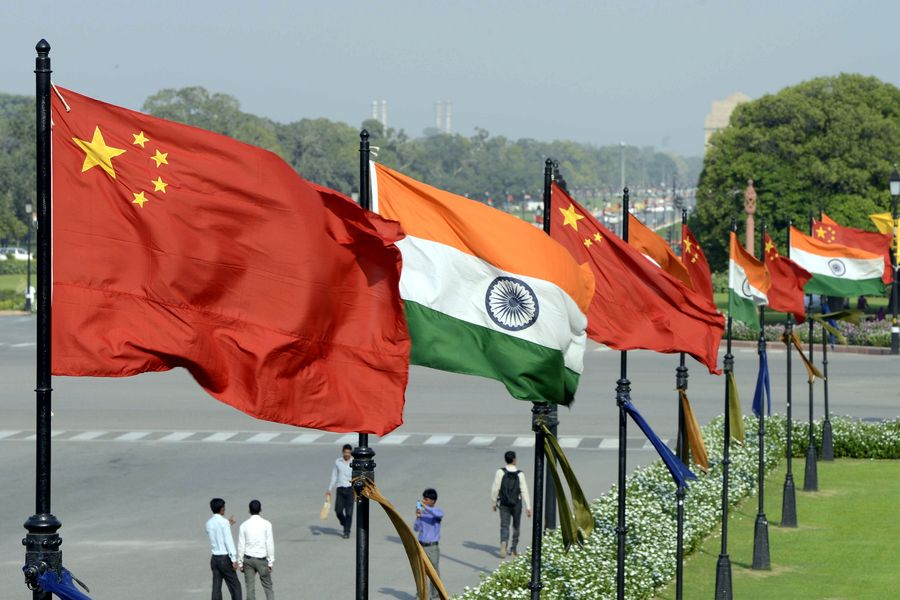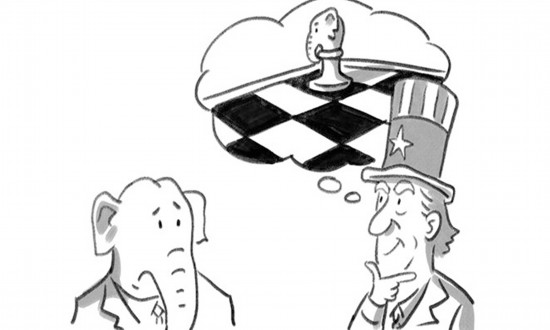Wang Yi's visit lends credence to strength of China-India ties

Visiting Chinese State Councilor and Foreign Minister Wang Yi (L) talks with Indian External Affairs Minister Subrahmanyam Jaishankar in New Delhi, India, March 25, 2022. Photo:Xinhua
“China and India should be partners for mutual success instead of adversaries of mutual attrition,” this was the key message on the India-China relationship delivered by Chinese State Councilor and Foreign Minister Wang Yi at a press conference on the sidelines of the country's 2022 “Two Sessions” on March 7. Quoting an Indian proverb, he further said, “Help your brother's boat across, and your own boat will reach the shore.” His eloquent message is a clear indication that the two close neighbors – China and India – should cooperate with each other and engage in dialogue to resolve the several hotspot issues affecting bilateral ties.
The bloody memories of the incident in the Galwan Valley at the western section of the China-India boundary, which occurred in June 2020 between the Indian and Chinese militaries, have not faded yet. There is no denying that the untoward incident has visibly fragmented the Sino-Indian relationship, tearing both countries apart and significantly affecting the socio-economic dimensions of two Himalayan neighbors for the past two years.
Against this backdrop, and as part of a pan-South Asian tour to Pakistan, Afghanistan and Nepal, Wang Yi paid a visit to India on March 25 in a bid to advance mutually beneficial cooperation and in order to put an end to the diplomatic frostiness between the two Asian powers.
Wang Yi is the highest-level Chinese official to visit India since the border clashes at the Galwan Valley. The duration of Wang’s stay in New Delhi was short but the canvas of his visit was of great symbolic significance at a time when Sino-Indian relations seem to be in “a very difficult phase,” which has arisen from a long-standing military standoff.

Indian and Chinese national flags flutter side by side at the Raisina hills in New Delhi, India, in this file photo. [Photo/Xinhua]
Wang Yi’s New Delhi visit can be seen as an icebreaker. His visit demonstrated that the two countries are ready to make some course corrections in their approach to each other as bilateral cooperation – particularly in the areas of trade and economic partnership and people-to-people relations – has suffered to a large degree as a result of the ongoing border dispute.
In a statement, the Chinese Foreign Minister said that the two sides should not allow the border dispute to define their relationship or to affect the overall development of bilateral ties. “China does not pursue a so-called ‘unipolar Asia’ and respects India's traditional role in the region. China is ready to explore ‘China-India Plus’ cooperation in South Asia and forge a sound model for interaction so as to achieve mutual benefit and win-win results at a higher level and in a wider range,” Wang said, according to the Chinese Ministry of Foreign Affairs.
It has been reported that during the meetings both sides also exchanged their views on the ongoing Russia-Ukraine conflict, the Afghan issue, COVID-19 responses and other multilateral issues.

US-India Illustration: Liu Rui/GT
The Ukraine crisis has offered both India and China a chance to stand together against the United States, which is merely using Ukraine as a pawn. India didn’t join the U.S.-led western camp to impose sanctions against Russia, for which the U.S. has already put India at some pressure. So far, both India and China abstained on Ukraine-related resolutions at the UN Security Council and Human Rights Council. It is an opportune time, therefore, for the two close neighbors to speak out in one voice against the U.S. for its failure to assume due responsibility, including how the U.S.-backed NATO alliance in Europe ignored Russia’s security concerns as well.
The essence of Wang Yi's visit has demonstrated that both sides are determined to enhance mutual trust and focus on cooperation while properly managing differences in a bid to take the bilateral relationship to a new level.
It is unrealistic to expect that India and China will have no differences and all unresolved issues will disappear in the near future, but bilateral dialogue will go a long way to help reset testy India-China ties on the basis of mutual respect. On the whole, Wang’s visit will surely have lent some credence to the strength of China-India ties while offering a heightened promise and stronger confidence in the trade and economic patterns that characterize the “dance of the Dragon and the Elephant,” providing more benefits to the two peoples residing on either side of the Himalayas.
Rabi Sankar Bosu is founder and secretary of New Horizon Radio Listeners' Club, a Sino-India friendship club based in West Bengal, India.
The opinions expressed in the article reflect those of the author, and not necessarily those of People's Daily Online.
Photos
Related Stories
- China-India corps commander level meeting yields positive, constructive results: spokesperson
- Chinese FM calls for long-term vision, win-win cooperation in ties with India
- China, India agree to strengthen communication for furthering ties
- Acupuncture -- a bridge of friendship between India, China
- India's new envoy to China assumes office amid welcoming voices, expectations to improve ties
Copyright © 2022 People's Daily Online. All Rights Reserved.










